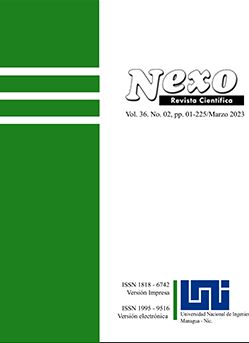Impact of technical and technological modernization and special measures in addressing food security
DOI:
https://doi.org/10.5377/nexo.v36i02.16055Keywords:
food independence, economic affordability of milk, state support, technical and technological modernization, cooperationAbstract
The paper assesses food security in the consumption of milk and dairy products in the Russian Federation and shows the role of individual categories of farms in solving the food problem. Analysis of trends and factors in the development of dairy cattle breeding substantiates the directions for providing the country's population with milk according to the rational nutritional standards in light of international sanctions. The agrarian policy pursued by the state has increased milk production and reduced its imports but has not solved the problem of food security in the consumption of dairy products. The authors conclude that food security in the consumption of milk and dairy products will be supported by import substitution in the food market, the increase in milk production through technical and technological modernization of dairy farming, improvement of selection and breeding work and state support, concentration of milk production in specialized agricultural organizations and farms, the development of cooperation, improvement of livestock productivity through the use of modern technologies, improved use of the genetic potential of cows, strengthening of the feed base, and optimization of feed rations.
Downloads
2596
Downloads
Published
How to Cite
Issue
Section
License
Copyright (c) 2023 Universidad Nacional de Ingeniería

This work is licensed under a Creative Commons Attribution 4.0 International License.
The authors who publish in Nexo Scientific Journal agree to the following terms:
- Authors retain the copyright and grant the journal the right of the first publication under the license Creative Commons Attribution License, which allows others to share the work with a recognition of the authorship of the work and the initial publication in Nexo Scientific Journal.
- Authors may separately establish additional agreements for the non-exclusive distribution of the version of the work published in the journal (for example, in an institutional repository or a book), with the recognition of the initial publication in Nexo Scientific Journal.
- Authors are allowed and encouraged to disseminate their works electronically (for example, in institutional repositories or in their own website) before and during the submission process, as it can lead to productive exchanges, as well as earlier and greater citation of published works.










